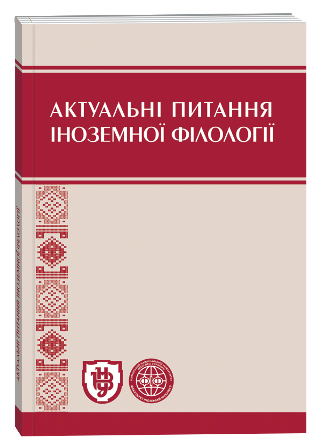THE HISTORY OF FANFICTION DEVELOPMENT AS A GENRE OF SECONDARY COMMUNICATION
DOI:
https://doi.org/10.32782/2410-0927-2021-14-16Keywords:
secondary communication, genre, fan fiction, fandomAbstract
The article is devoted to the history of the formation and development of fan fiction as a genre of secondary communication. The research was performed within the framework of communicative linguistics. Fan fiction as a genre of modern Internet discourse is a secondary text, i.e. written on the motives, plot, etc. of the original work. The history of fan fiction is directly related to the history of fan communities or fandoms, as one of the defining characteristics of fan fiction is its focus on fans. Fans of science fiction began to use the term «fandom» to denote their community in the 20s of XX century. The first mass surge of fan fiction was recorded in the late 60’s, when the series Star Trek: The Original Series was released. During the show, fans of the series prepared a printed version of the collection of fan fiction written by them. Researchers agree that the spread of the Internet was a turning point in the history of fandom and fan fiction. The global network has overcome all the limitations and barriers that existed before: the distribution of texts has become a matter of seconds, there are huge opportunities for readers to communicate with each other and with authors, access to the fandom community has become as easy as possible. Early works on fan fiction often viewed this phenomenon from a gender perspective, as fan fiction practice is predominantly female. The most common source for the study of fan fiction was fandom materials from popular TV series at the time. The main focus of the study of fandoms was the practices and values of their members, the characteristics of the fan as a person, as well as the distinctive features of the culture created by the members of the fandoms. The history of fan fiction and its research has come a long way from negative interpretation to the study within literary works, Internet linguistics and communicative linguistics. A promising continuation of this study is to consider the typology of genres of English fan fiction.
References
Андреев А. В. С e t e r a. Манифест Сетевой Литературы, или Личный Опыт Поэтической Независимости. Теория литературы. 1997. URL: http://www.netslova.ru/esse/manif.html (дата звернення: 28.10.2021).
Дев’ятко Н. В. Фанфікшен як новітній тип молодіжної літературної творчості: психологічні і соціальні аспекти. ADVANCES OF SCIENCE: Proceedings of articles the international scientific conference. Czech Republic, Karlovy Vary – Ukraine, Kyiv, 28 September 2018 / Editors prof. L. N. Katjuhin, I. A. Salov, I. S. Danilova, N. S. Burina. Kyiv : MCNIP, 2018. C. 581–591.
Денисова А. И. Фанфикшн как субкультура и феномен массовой литературы. Аналитика культурологии. 2012. № 24. С. 141–143.
Елисеева А. Д. Феномен фанфикшена в эпоху цифровых технологий. Многомерность общества: цифровой поворот в гуманитарном знании: 3-й молодежный конвент : материалы международной студенческой конференции 14–16 марта 2019 года. Екатеринбург : Издательство Уральского университета, 2019. С. 61–63.
Ионова С. В. Традиционные и новые формы лингвистической вторичности. Вестник Волгоградского государственного университета. Серия 2: Языкознание, no. 3. 2013. С. 27–33.
Попова С. Н. Лингвостилистика фанфикшн: на материале англоязычных сайтов, посвященных творчеству Дж. Р. Р. Толкина : дис. ... канд. філол. наук: 10.02.04. 2009. 187 с.
Прасолова К. А. Фанфикшн: литературный феномен конца XX – начала XXI века: творчество поклонников Дж. К. Ролинг : дис. ... канд. філол. наук: 10.01.03. Калининград, 2009. 261 с.
Coppa, F. A Brief History of Media Fandom. Fan fiction and fan communities in the age of the Internet, ed. Busse K. and Hellekson K. NC, 2006. 41–59.
Crystal D. The scope of Internet linguistics. 2005. URL: https://web.archive.org/web/20110726112040/http://www.davidcrystal.com/DC _articles/Internet2.pdf (дата звернення: 28.10.2021).
Jenkins H. Textual poachers: Television fans and participatory culture. London: Routledge, 1992. 424 p.
Rosenblatt B. The Great Game and the copyright villain. Transformative Works and Cultures. 2017. № 23. URL: https://doi.org/10.3983/twc.2017.0923 (дата звернення: 28.10.2021).







